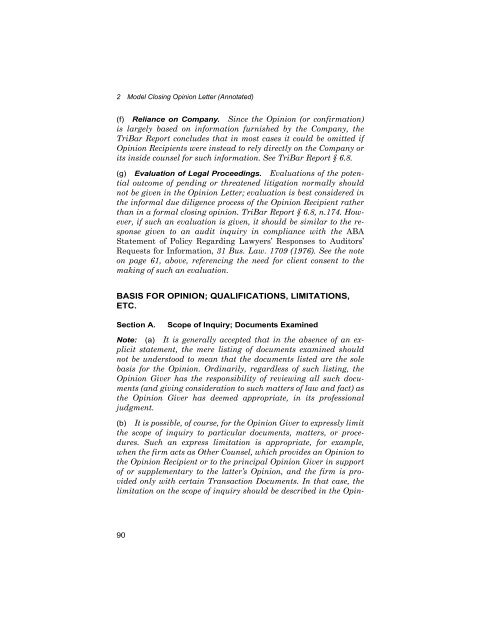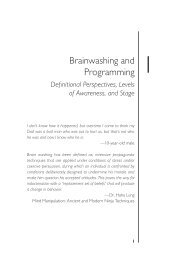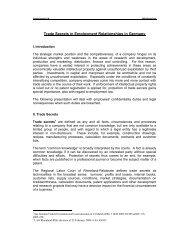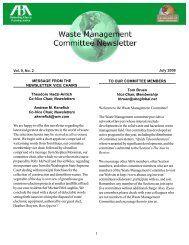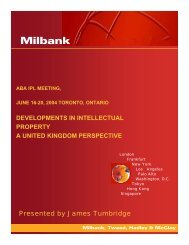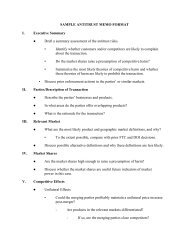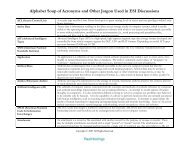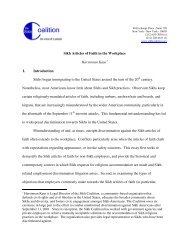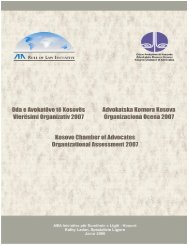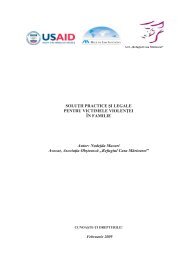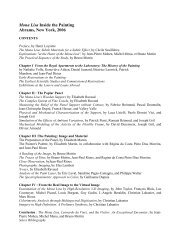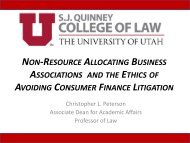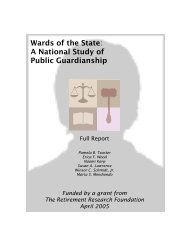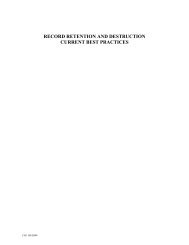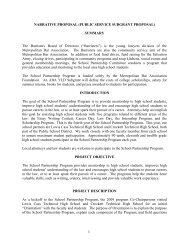Model Closing Opinion Letter (Annotated) - American Bar Association
Model Closing Opinion Letter (Annotated) - American Bar Association
Model Closing Opinion Letter (Annotated) - American Bar Association
You also want an ePaper? Increase the reach of your titles
YUMPU automatically turns print PDFs into web optimized ePapers that Google loves.
2 <strong>Model</strong> <strong>Closing</strong> <strong>Opinion</strong> <strong>Letter</strong> (<strong>Annotated</strong>)<br />
(f) Reliance on Company. Since the <strong>Opinion</strong> (or confirmation)<br />
is largely based on information furnished by the Company, the<br />
Tri<strong>Bar</strong> Report concludes that in most cases it could be omitted if<br />
<strong>Opinion</strong> Recipients were instead to rely directly on the Company or<br />
its inside counsel for such information. See Tri<strong>Bar</strong> Report § 6.8.<br />
(g) Evaluation of Legal Proceedings. Evaluations of the potential<br />
outcome of pending or threatened litigation normally should<br />
not be given in the <strong>Opinion</strong> <strong>Letter</strong>; evaluation is best considered in<br />
the informal due diligence process of the <strong>Opinion</strong> Recipient rather<br />
than in a formal closing opinion. Tri<strong>Bar</strong> Report § 6.8, n.174. However,<br />
if such an evaluation is given, it should be similar to the response<br />
given to an audit inquiry in compliance with the ABA<br />
Statement of Policy Regarding Lawyers’ Responses to Auditors’<br />
Requests for Information, 31 Bus. Law. 1709 (1976). See the note<br />
on page 61, above, referencing the need for client consent to the<br />
making of such an evaluation.<br />
BASIS FOR OPINION; QUALIFICATIONS, LIMITATIONS,<br />
ETC.<br />
Section A. Scope of Inquiry; Documents Examined<br />
Note: (a) It is generally accepted that in the absence of an explicit<br />
statement, the mere listing of documents examined should<br />
not be understood to mean that the documents listed are the sole<br />
basis for the <strong>Opinion</strong>. Ordinarily, regardless of such listing, the<br />
<strong>Opinion</strong> Giver has the responsibility of reviewing all such documents<br />
(and giving consideration to such matters of law and fact) as<br />
the <strong>Opinion</strong> Giver has deemed appropriate, in its professional<br />
judgment.<br />
(b) It is possible, of course, for the <strong>Opinion</strong> Giver to expressly limit<br />
the scope of inquiry to particular documents, matters, or procedures.<br />
Such an express limitation is appropriate, for example,<br />
when the firm acts as Other Counsel, which provides an <strong>Opinion</strong> to<br />
the <strong>Opinion</strong> Recipient or to the principal <strong>Opinion</strong> Giver in support<br />
of or supplementary to the latter’s <strong>Opinion</strong>, and the firm is provided<br />
only with certain Transaction Documents. In that case, the<br />
limitation on the scope of inquiry should be described in the Opin-<br />
90


